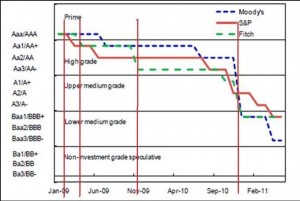Brooks Cries Crocodile Tears as Reporters Go Home Jobless to Tots.
Portugal’s debt has just been downgraded to junk bond status. Ireland’s efforts to boost investor confidence are under threat; Italy is starting to look wobbly.
European politicians are openly expressing their anger at the three main ratings agencies’ oligopoly, accusing them of attempting to exercise improper influence over policy-making – the timing of their downgrades is ‘not a coincidence’, and they are ‘playing politics, not economics’.
Evidence from Ireland bears this out – there seems to be no consistency in the way the ratings agencies evaluate the decisions of governments in the Eurozone periphery. Governments are put under pressure to engage in ‘orthodox’ fiscal retrenchment, in line with the EU’s excessive deficit procedures, and as required of Greece, Ireland and Portugal in line with their IMF-EU loan programmes. But as soon as they take relevant action, they find their ratings downgraded on the ‘heterodox’ grounds that taking money out of the economy will damage growth potential. Two bodies of economic theory seem to be at work here: ‘expansionary fiscal contraction’ when the aim is to enforce cuts, Keynesian counter-cyclical policy when the objective is to punish excessive contraction. Damned if you do and damned if you don’t.
Take a look at this graph, from the IMF’s May report on Ireland.
Each of the vertical red lines I’ve added represents an ‘orthodox’ fiscal adjustment on the part of the Irish government between February 2009 and December 2010. The balance was about 65% spending cuts and 35% tax increases, entirely consistent with conventional thinking. The profile looks like this:
The overall adjustment between 2008 and2014 is €29.6bn. This would be equivalent to about 19% GDP and 22% GNP in 2010. Yet Ireland’s ratings have been consistently cut.
Very odd.
My performance/recording vs. oral/literary post has gotten lots of comments, so let’s see if I can drive you all off with a follow-up.
Two other books about the evolution of reading culture I read recently: Space Between Words: The Origins of Silent Reading, by Paul Saenger; and Silent Reading and the Birth of the Narrator
, by Elspeth Jajdelska.
The Saenger book concerns the Rodney Dangerfield of punctuation marks: the space. (Why do you think that’s the largest key on your keyboard, hmmm?) Let me quote the publisher’s blurb in a way that makes Saenger’s point. Once upon a time, European scribes wrote like this: [click to continue…]
This is a good post about why rape victims are likely to lie…about the circumstances of the rape in order to make their rape conform to the narrative they think the cops/prosecutors/jury needs to hear.
Thanks to prevailing rape mythology, many people also have very definite ideas about what happens before, during, and after a “real” rape. Real rape victims want no sexual contact of any kind with their attackers and make this crystal clear right from the start. When attacked, they don’t just say “No;” they scream, fight, yell for help, and/or try to escape. Ideally, the victim will duke it out with her attacker to such an extent that she is left with obvious physical injuries. After the rape, she will be visibly distraught and in tears, but this will not prevent her from reporting the attack right away. In the days and weeks following the assault, she will spend a lot of time in the shower and be too traumatized to appear to function normally.
Some rapes do indeed happen like that; most don’t. And the more a rape departs from this script, the harder it is for the victim to be believed and taken seriously. She didn’t fight or try to escape? She must’ve wanted it. She wasn’t crying or visibly upset right after the rape? She’s probably lying about being attacked. She was seen laughing and seemingly having a good time just days after being raped? It couldn’t have been that bad.
Rape victims know this. Realizing that many people won’t understand why you acted in a way that doesn’t fit their preconceived notions of “how rape victims act,” or worse, knowing that many people will automatically disbelieve you because of your background or even blame you for being attacked brings some rape victims to the conclusion that there’s only one way they’re going to see their rapist punished: lie.

